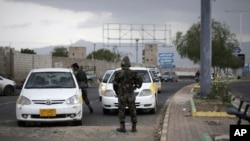STATE DEPARTMENT —
Several U.S. embassies and consulates remain closed as the U.S. works to counter potential al-Qaida attacks in the Middle East.
Another day of 19 U.S. embassy closings around the world...another day of drone strikes in Yemen. The latest attack killed at least seven al-Qaida militants.
Anthony Cordesman, at the Center for Strategic and International Studies in Washington, says drones are crucial in the fight against terrorists.
“Unless you basically are willing to tolerate the growth of terrorist networks without any U.S. action except trying to defend the borders of the United States, this is the best tool we have," said Cordesman.
Yemen remains a hub for al-Qaida, even as authorities there say security forces foiled an attempted attack on Westerners in the country’s south. Defense Minister Mohammad Nasser Ahmad:
"We can reassure you that the military forces will be acting with an iron fist and will maintain stability and security no matter what the sacrifices will be," said Ahmad.
But back in Washington, the State Department says that's not enough to bring its employees back to the capital, Sana’a. Spokeswoman Jen Psaki:
“We are keeping it closed to keep our people safe and because we believe a threat remains," said Psaki.
The State Department’s threat warning has closed between 19 and 22 embassies and consulates at a given time. Daniel Serwer, an analyst at Johns Hopkins University, criticizes the move.
“It was a warning for a fairly substantial period of time in 22 countries. I mean, who can react to that? That’s not a useful kind of warning," said Serwer.
Anthony Cordesman disagrees.
“It isn’t just a matter of Yemen. It isn’t just a matter even of al-Qaida in the Arabian Peninsula. The guidance that was coming from al-Qaida central, al-Zawahiri in Pakistan, also affected areas in Iraq and the Maghreb," he said.
The global threat revived painful memories in Kenya and Tanzania, where al-Qaida attacks on the U.S. embassies there killed more than 200 people 15 years ago.
Another day of 19 U.S. embassy closings around the world...another day of drone strikes in Yemen. The latest attack killed at least seven al-Qaida militants.
Anthony Cordesman, at the Center for Strategic and International Studies in Washington, says drones are crucial in the fight against terrorists.
“Unless you basically are willing to tolerate the growth of terrorist networks without any U.S. action except trying to defend the borders of the United States, this is the best tool we have," said Cordesman.
Yemen remains a hub for al-Qaida, even as authorities there say security forces foiled an attempted attack on Westerners in the country’s south. Defense Minister Mohammad Nasser Ahmad:
"We can reassure you that the military forces will be acting with an iron fist and will maintain stability and security no matter what the sacrifices will be," said Ahmad.
But back in Washington, the State Department says that's not enough to bring its employees back to the capital, Sana’a. Spokeswoman Jen Psaki:
“We are keeping it closed to keep our people safe and because we believe a threat remains," said Psaki.
Al-Qaida in the Arabian Peninsula
Al-Qaida in the Arabian Peninsula- Formed by a 2009 merger of al-Qaida's Yemen and Saudi branches
- Led by Nasir al-Wahishi, former assistant to Osama bin Laden
- Established sanctuaries in Yemen, overrunning entire towns and villages
- Was behind unsuccessful underwear bomb plot on Christmas Day 2009
- Was behind foiled 2010 plot to send mail bombs hidden in toner cartridges to the US
“It was a warning for a fairly substantial period of time in 22 countries. I mean, who can react to that? That’s not a useful kind of warning," said Serwer.
Anthony Cordesman disagrees.
“It isn’t just a matter of Yemen. It isn’t just a matter even of al-Qaida in the Arabian Peninsula. The guidance that was coming from al-Qaida central, al-Zawahiri in Pakistan, also affected areas in Iraq and the Maghreb," he said.
The global threat revived painful memories in Kenya and Tanzania, where al-Qaida attacks on the U.S. embassies there killed more than 200 people 15 years ago.














